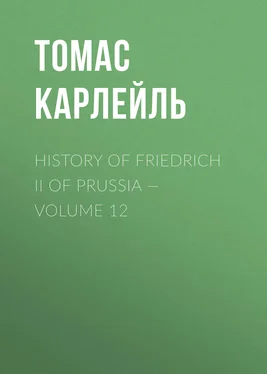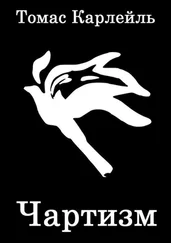Томас Карлейль - History of Friedrich II of Prussia — Volume 12
Здесь есть возможность читать онлайн «Томас Карлейль - History of Friedrich II of Prussia — Volume 12» — ознакомительный отрывок электронной книги совершенно бесплатно, а после прочтения отрывка купить полную версию. В некоторых случаях можно слушать аудио, скачать через торрент в формате fb2 и присутствует краткое содержание. Жанр: foreign_prose, История, literature_19, foreign_edu, foreign_antique, на английском языке. Описание произведения, (предисловие) а так же отзывы посетителей доступны на портале библиотеки ЛибКат.
- Название:History of Friedrich II of Prussia — Volume 12
- Автор:
- Жанр:
- Год:неизвестен
- ISBN:нет данных
- Рейтинг книги:3 / 5. Голосов: 1
-
Избранное:Добавить в избранное
- Отзывы:
-
Ваша оценка:
- 60
- 1
- 2
- 3
- 4
- 5
History of Friedrich II of Prussia — Volume 12: краткое содержание, описание и аннотация
Предлагаем к чтению аннотацию, описание, краткое содержание или предисловие (зависит от того, что написал сам автор книги «History of Friedrich II of Prussia — Volume 12»). Если вы не нашли необходимую информацию о книге — напишите в комментариях, мы постараемся отыскать её.
History of Friedrich II of Prussia — Volume 12 — читать онлайн ознакомительный отрывок
Ниже представлен текст книги, разбитый по страницам. Система сохранения места последней прочитанной страницы, позволяет с удобством читать онлайн бесплатно книгу «History of Friedrich II of Prussia — Volume 12», без необходимости каждый раз заново искать на чём Вы остановились. Поставьте закладку, и сможете в любой момент перейти на страницу, на которой закончили чтение.
Интервал:
Закладка:
"These Silesians," says an Excerpt I have made, "are still in majority Protestant; especially in this Northern portion of the Province; they have had to suffer much on that and other scores; and are secretly or openly in favor of the Prussians. Official persons, all of the Catholic creed, have leant heavy, not always conscious of doing it, against Protestant rights. The Jesuits, consciously enough, have been and are busy with them; intent to recall a Heretic Population by all methods, fair and unfair. We heard of Charles XII.'s interference, three-and-thirty years ago; and how the Kaiser, hard bested at that time, had to profess repentance and engage for complete amendment. Amendment did, for the moment, accordingly take place. Treaty of Westphalia in all its stipulations, with precautionary improvements, was re-enacted as Treaty of Altranstadt; with faithful intention of keeping it too, on Kaiser Joseph's part, who was not a superstitious man: 'Holy Father, I was too glad he did not demand my own conversion to the Protestant Heresy, bested as I am,—with Louis Quatorze and Company upon the neck of me!' Some improvement of performance, very marked at first, did ensue upon this Altranstadt Treaty. But the sternly accurate Karl of Sweden soon disappeared from the scene; Kaiser Joseph of Austria soon disappeared; and his Brother, Karl VI., was a much more orthodox person.
"The Austrian Government, and Kaiser Karl's in particular, is not to be called an intentionally unjust one; the contrary, I rather find; but it is, beyond others, ponderous; based broad on such multiplex formalities, old habitudes; and GRAVITATION has a great power over it. In brief, Official human nature, with the best of Kaisers atop, flagitated continually by Jesuit Confessors, does throw its weight on a certain side: the sad fact is, in a few years the brightness of that Altranstadt improvement began to wax dim; and now, under long Jesuit manipulation, Silesian things are nearly at their old pass; and the patience of men is heavily laden. To see your Chapel made a Soldiers' Barrack, your Protestant School become a Jesuit one,—Men did not then think of revolting under injuries; but the poor Silesian weaver, trudging twenty miles for his Sunday sermon; and perceiving that, unless their Mother could teach the art of reading, his boys, except under soul's peril, would now never learn it: such a Silesian could not want for reflections. Voiceless, hopeless, but heavy; and dwelling secretly, as under nightmare, in a million hearts. Austrian Officiality, wilfully unjust, or not wilfully so, is admitted to be in a most heavy-footed condition; can administer nothing well. Good Government in any kind is not known here: Possibly the Prussian will be better; who can say?
"The secret joy of these populations, as Friedrich advances among them, becomes more and more a manifest one. Catholic Officials do not venture on any definite hope, or definite balance of hope and fear, but adopt the Mayor of Grunberg's course, and study to be passive and silent. The Jesuit-Priest kind are clear in their minds for Austria; but think, Perhaps Prussia itself will not prove very tyrannous? At all events, be silent; it is unsafe to stir. We notice generally, it is only in the Southern or Mountain regions of Silesia, where the Catholics are in majority, that the population is not ardently on the Prussian side. Passive, if they are on the other side; accurately passive at lowest, this it is prescribed all prudent men to be."
On the 18th, while divine service went on at Weichau, there was at Breslau another phenomenon observable. Provincial Government in Breslau had, at length, after intense study, and across such difficulties as we have no idea of, got its "Patent," or carefully worded Protestation against Prussia, brought to paper; and does, this day, with considerable solemnity, affix it to the Rathhaus door there, for the perusal of mankind; despatching a Copy for his Prussian Majesty withal, by two Messengers of dignity. It has needed courage screwed to the sticking-place to venture on such a step, without instruction from Head-quarters; and the utmost powers of the Official mind have been taxed to couch this Document in language politely ambiguous, and yet strong enough;—too strong, some of us now think it. In any case, here it now is; Provincial Government's bolt, so to speak, is shot. The affixing took place under dark weather-symptoms; actual outburst of thunder and rain at the moment, not to speak of the other surer omens. So that, to the common mind at Breslau, it did not seem there would much fruit come of this difficult performance. Breslau is secretly a much-agitated City; and Prussian Hussar Parties, shooting forth to great distances ahead, were, this day for the first time, observed within sight of it.
And on the same Sunday we remark farther, what is still more important: Herr von Gotter, Friedrich's special Envoy to Vienna, has his first interview with the Queen of Hungary, or with Grand-Duke Franz the Queen's Husband and Co-Regent; and presents there, from Friedrich's own hand, written we remember when, brief distinct Note of his Prussian Majesty's actual Proposals and real meaning in regard to this Silesian Affair. Proposals anxiously conciliatory in tone, but the heavy purport of which is known to us: Gotter had been despatched, time enough, with these Proposals (written above a month ago); but was instructed not to arrive with them, till after the actual entrance into Silesia. And now the response to them is—? As good as nothing; perhaps worse. Let that suffice us at present. Readers, on march for Glogau, would grudge to pause over State-papers, though we shall have to read this of Friedrich's at some freer moment.
Monday, 19th, before daybreak, the Army is astir again, simultaneously wending forward; spread over wide areas, like a vast cloud (potential thunder in it) steadily advancing on the winds. Length of the Army, artistically portioned out, may be ten or fifteen miles, breadth already more, and growing more; Schwerin always on the right or western wing, close by the Bober River as yet, through Naumburg and the Towns on that side,—Liegnitz and other important Towns lying ahead for Schwerin, still farther apart from the main Body, were Glogau once settled.
So that the march is in two Columns; Schwerin, with the westernmost small column, intending towards Liegnitz, and thence ever farther southward, with his right leaning on the high lands which rise more and more into mountains as you advance. Friedrich himself commands the other column, has his left upon the Oder, in a country mounting continually towards the South, but with less irregularity of level, and generally flat as yet. From beginning to end, the entire field of march lies between the Oder and its tributary the Bober; climbing slowly towards the sources of both. Which two rivers, as the reader may observe, form here a rectangular or trapezoidal space, ever widening as we go southward. Both rivers, coming from the Giant Mountains, hasten directly north; but Oder, bulging out easterly in his sandy course, is obliged to turn fairly westward again; and at Glogau, and a good space farther, flows in that direction;—till once Bober strikes in, almost at right angles, carrying Oder with HIM, though he is but a branch, straight northward again. Northward, but ever slower, to the swollen Pommern regions, and sluggish exit into the Baltic there.
One of the worst features is the state of the weather. On Sunday, at Breslau, we noticed thunder bursting out on an important occasion; "ominous," some men thought;—omen, for one thing, that the weather was breaking. At Weichau, that same day, rain began,—the young Herr of Weichau, driving home to Papa from dinner with Majesty, would get his share of it;—and on Monday, 19th, there was such a pour of rain as kept most wayfarers, though it could not the Prussian Army, within doors. Rain in plunges, fallen and falling, through that blessed day; making roads into mere rivers of mud. The Prussian hosts marched on, all the same. Head-quarters, with the van of the wet Army, that night, were at Milkau;—from which place we have a Note of Friedrich's for Friend Jordan, perhaps producible by and by. His Majesty lodged in some opulent Jesuit Establishment there. And indeed he continued there, not idle, under shelter, for a couple of days. The Jesuits, by their two head men, had welcomed him with their choicest smiles; to whom the King was very gracious, asking the two to dinner as usual, and styling them "Your Reverence." Willing to ingratiate himself with persons of interest in this Country; and likes talk, even with Jesuits of discernment.
Читать дальшеИнтервал:
Закладка:
Похожие книги на «History of Friedrich II of Prussia — Volume 12»
Представляем Вашему вниманию похожие книги на «History of Friedrich II of Prussia — Volume 12» списком для выбора. Мы отобрали схожую по названию и смыслу литературу в надежде предоставить читателям больше вариантов отыскать новые, интересные, ещё непрочитанные произведения.
Обсуждение, отзывы о книге «History of Friedrich II of Prussia — Volume 12» и просто собственные мнения читателей. Оставьте ваши комментарии, напишите, что Вы думаете о произведении, его смысле или главных героях. Укажите что конкретно понравилось, а что нет, и почему Вы так считаете.









